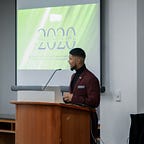Avoid Making This Mistake When Giving a Speech
One of the most common mistakes made during speeches and presentations is beginning with an excuse or apology. Examples:
“I didn’t get much time to prepare for this so please bear with me.”
“I’m feeling sick so I apologize for my voice in advance.”
The reason we may start a speech with a disclaimer is to lower the expectations of the listeners. By lowering the audience’s expectations, we assume that it’s now much easier to meet their (lowered) expectations, and therefore give a great speech. While this may seem like a brilliant trick, there’s a major flaw in the logic. 👎
The Flaw with Disclaimers
You started off by giving the audience the impression that you’re not going to do a great job. They are now EXPECTING you to do a bad job. How people expect you to perform can impact how they receive your performance. This is known as the Confirmation Bias in psychology, where individuals favour information that confirms previously existing beliefs.
If I tell you George is a horrible speaker, you’re more likely to listen to his speech in a way that confirms your negative expectation of him. You might actively look for his mistakes instead of just listening.
When you begin your presentation with a disclaimer, you’re giving the audience a reason to actively look for parts of your speech that confirm the disclaimer.
While it’s possible to prove their expectations wrong, you’re going to have to deliver a speech twice as good.
What can I do to make my Speech a Success?
So the next time you’re about to begin your speech and all eyes are on you, take the following steps to ensure your success:
- Prepare well. If you’re well-prepared, you’re more confident.
- Don’t begin with a disclaimer. Even if you are sick, or you were given short notice to speak, be confident and deliver anyways. People in the audience tend to be less critical of us than we think. You are your worst critic. Leave the criticism for after the speech. Right now it’s time to shine.
Best wishes on your next speech/presentation! 😀
In some cases a disclaimer can actually be beneficial to your speech, but that’s for more specific cases. We’ll visit them in another post.
